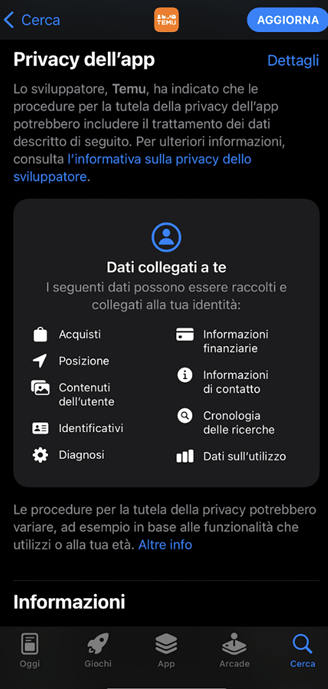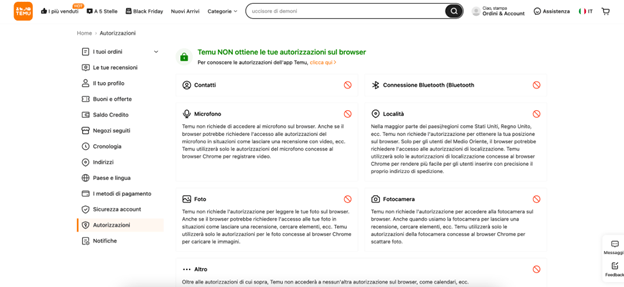In this article we will discover and analyze all the details relating to the very famous application: Temu
Now that digital shopping is increasingly an integral part of our daily lives, it is extremely important to clarify how e-commerce apps manage our data. Here we examine Temu, a rising star in the online market which is becoming popular in Germany, and let’s see how it manages its users’ data to ensure transparency and maintain their trust. This is how Temu processes your personal data.
Temu’s approach to data collection: Temu’s philosophy is simple: it collects data for the sole purpose of providing and improving your shopping experience. Temu actually collects less information about users than other consumer apps, focusing only on what is necessary to process and improve its service. This means that, unlike other apps, Temu doesn’t see your contacts or can’t check your location.
What data does Temu collect?

Here is an overview of all categories of data that Temu collects with its purpose, based on data disclosure on the Apple App Store:
- Purchases and financial information: Temu requires this information to process and fulfill orders.
- Location data: Temu requires access to location permissions only in the Middle East to facilitate filling in shipping addresses. Accurate location capabilities are critical for delivery addresses in the Middle East due to the lack of a comprehensive address system.
- contact info: in addition to processing orders, these data are necessary for creating a profile. That is, the user’s contact information, not the phone book.
- User Content: This data allows users to upload photos, leave a review, search for items with an image, contact customer support, etc. Temu uses the photo picker built into your smartphone’s operating system to choose and upload images without asking for permission to access your entire photo gallery.
- Search history: This data refers to user searches on Temu, which help the app offer a more personalized experience by recommending products or services that may be interesting to the user.
- Identifier, diagnostics and usage data: Most, if not all apps routinely collect such data to identify a profile or device, analyze/identify app crash issues, and continually improve their services.
Temu and app permissions
Following increased concerns about data security, Temu has publicly shared how it manages app permissions. The app kept permission requests to a minimum. To allow users to easily view required permissions, Temu has created ad hoc information within the settings in the app or on the permissions disclosure web page. Application permissions are security measures put in place by your phone’s operating system (such as Android or iOS) to control what apps can and cannot do.
They function as safety doors that ensure that apps only access the features or data they absolutely need and that the user is aware of this and has accepted. For example, apps may need permission to access your location, use your camera, etc.
You may request specific permissions when installing or using certain features of an app. Then, if the user agreed, the app can use that feature or data. If the user refuses, then the app cannot use that function or data. Temu is committed to maintaining transparency and minimizing the use of permissions within our app.
Even when Temu uses photos to leave a review, search for articles, and so on, it will not directly obtain system permissions. Temu, in contrast, uses the user’s device’s built-in camera or photo picker. This means that users are always in control and the application can never access the device’s photos, camera or microphone without explicit permission from users. Temu’s approach is aimed at improving the security of its users.

Temu’s approach towards misunderstandings
Some people have taken issue with Temu for adopting intrusive data practices. However, these alarmisms often arise from misunderstandings. For example, Temu does not use device location services unless it absolutely has to necessary for functionality, as in the Middle East, where address systems are poorly structured. Temu’s privacy policy clearly explains the use of unique identifiers such as IMEI or MAC addresses, which are standard for most devices and apps. These are simply used to identify your device for a better user experience.
Temu supports users when it comes to data privacy and security, adhering to industry standards but opting for a more user-centric approach. Collecting less data and avoiding unnecessary system permissions, Temu demonstrates its commitment to user privacy and security. Those interested in more specific information can consult Temu’s full privacy policy available on its website, which offers insights into its data practices. Remember that choosing consciously is at the heart of data security in the digital age and Temu ensures that your shopping experience is safe and personalized.
For further news and updates, continue to tune in to techgameworld.com.
















Leave a Reply
View Comments